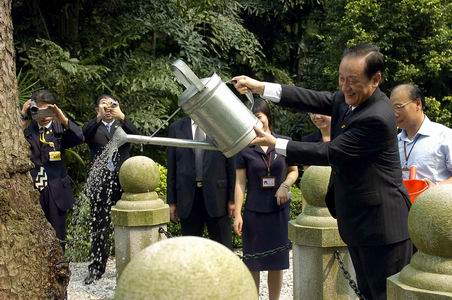
Yok Mu-ming, chairman of the New Party of Taiwan, waters a
tree planted by Dr Sun Yat-sen at the tombs of 72 Huanghuagang Martyrs in
Guangzhou, Guangdong Province, yesterday. Yok is on an eight-day tour to the
Chinese mainland. ¡ª Xinhua
The 30-member delegation of the New Party of Taiwan, headed by Chairman Yok
Mu-ming, arrived in Nanjing, capital of Jiangsu Province, yesterday afternoon on
the second leg of its eight-day mainland visit.
Upon arrival at Lukou
Airport, Yok said the delegation will mainly do two things in Nanjing: pay
tribute at the Mausoleum of Dr Sun Yat-sen, forerunner of the Chinese democratic
revolution, and offer condolences at the Memorial Hall of the Victims in the
Nanjing Massacre, an atrocity committed by invading Japanese troops during World
War II.
The delegation was met at the airport by Zhao Shaolin,
secretary-general of the Jiangsu provincial committee of the Communist Party of
China. The delegation arrived in Guangzhou on Wednesday afternoon to begin the
four-city mainland trip under the theme of commemorating the 60th anniversary of
China's victory in the war against Japanese aggression during WWII.
They will
also visit Dalian and Beijing.
In Guangzhou, the delegation paid homage to
the Huanghuagang 72 Martyrs' Tombs yesterday morning to honor the 72 people
killed in an abortive uprising to overthrow the Qing Dynasty (1644-1911).
In
front of the pine tree planted by Dr Sun, Yok said the delegation was here to
pursue the Chinese people's heroic spirit and cherish the memory of the martyrs
with hopes that people on the two sides of the Taiwan Strait will treasure the
opportunity of today, be united and work together to seek the prosperity of the
Chinese nation.
The delegation received a warm welcome from Guangzhou
residents, many of whom expressed hope the New Party will promote the
development of cross-strait relations and contribute to the peaceful
reunification of the motherland.
Yok said the New Party has named the
mainland tour a "journey of the Chinese nation" to show that they identify
themselves as members of the Chinese nation.



